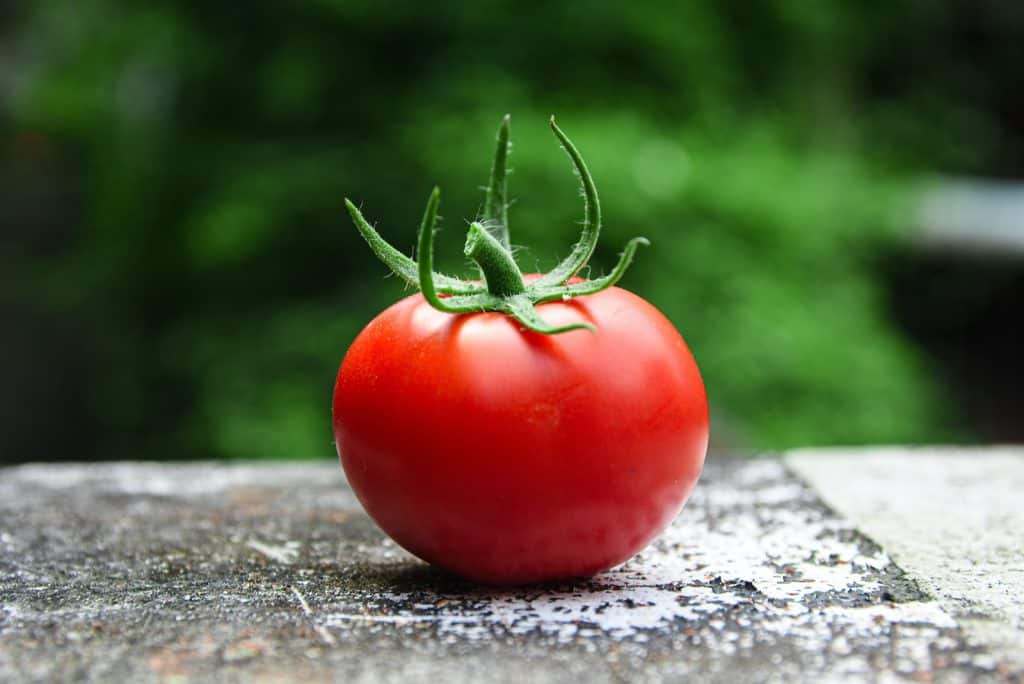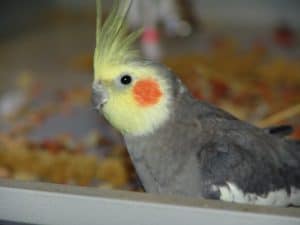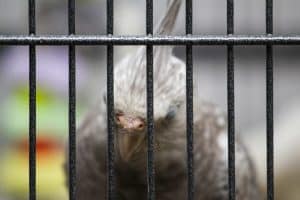Can cockatiels eat tomatoes? We as bird owners understand that our birds need a nutritious diet that includes lots of fresh fruits and vegetables on a daily basis. This is especially true for cockatiels! Cockatiels enjoy a wide range of fruits and vegetables, making it difficult to believe any of them would be harmful to your bird.
We generally believe that any fruit or vegetable is suitable for everyone, including humans and animals. When it comes to tomatoes, however, there is disagreement about whether they are hazardous to cockatiels. Let’s look at the reasons why some people feel that this fruit is okay for birds while others do not.
Can Cockatiels Eat Tomatoes?
Although tomatoes are not poisonous to cockatiels, some people do not give them this fruit because of the high acidity levels. The citric acid in tomatoes can bind with iron in the bird’s body, potentially causing iron storage disease. This disease causes difficulty breathing and other issues such as a swollen abdomen or paralysis. Too many tomatoes can cause stomach ulcers in cockatiels. While an Occasional tomato likely won’t harm your bird, you don’t want to overfeed them this fruit.
If you want to offer any of it to your cockatiel, put it in with other items. They should also not be fed tomatoes too frequently. Some people have given tomatoes to their birds without incident, so they claim that doing so is perfectly safe. However, because there’s even the tiniest possibility not to feed tomatoes to your cockatiel.
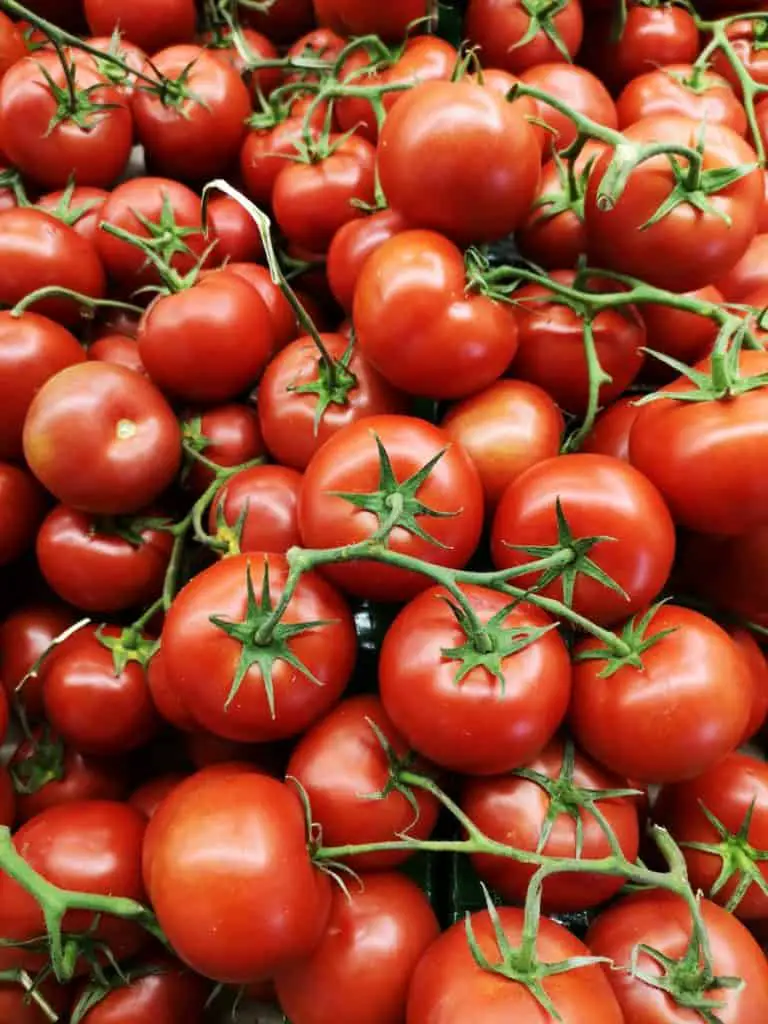
Can Cockatiels Eat Tomatoes: Green Tomatoes
Green tomatoes might be more acidic than red, ripe tomatoes. As a result, if you want to give your bird any green tomatoes at all, we recommend only giving them a bite or two.
Can Cockatiels Eat Tomatoes: Leaves and Stems
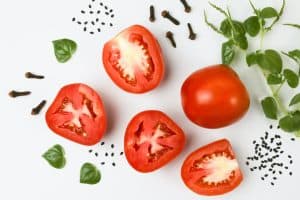
Though tomatoes are members of the nightshade family, and therefore their fruits should be safe for birds to eat, this is not the case for their leaves and stems. These parts of the plant contain solanine, which can cause your bird to become ill if ingested. Therefore, you should not allow your cockatiel to eat these parts of a tomato plant.
Can Cockatiels Eat Tomatoes: Are Any Tomatoes Okay for My Bird?
The best way to give your cockatiel tomatoes is by drying them out. By removing the acid, it makes it safer for your bird while also making it easier to chew since they become chewy. Dried tomatoes are much harder than fresh tomatoes and can be tough for your bird to eat. Try cutting them into small pieces so they can consume them more easily.
What Fruits and Vegetables Can Cockatiels Eat?
Cockatiels can eat a variety of fruits and vegetables, including raw tomatoes, such as red tomatoes and cherry tomatoes. However, it is important to note that cockatiels should not eat green tomatoes, as they can be toxic to them. Additionally, sun-dried tomatoes and canned tomatoes should be avoided since they may contain preservatives or added sodium that can be harmful to your cockatiel.
To prepare tomatoes for your cockatiel, be sure to wash them thoroughly and remove any stems or tomato vines. You can either slice the tomatoes or halve cherry tomatoes so your cockatiel can easily eat them. It’s also essential to remove any tomato seeds, as they can be potentially toxic to your bird.
In addition to tomatoes, cockatiels can also enjoy other fruits and vegetables such as apples, bananas, carrots, and leafy greens. However, it is important not to feed your cockatiel onions, as they can be toxic to them.
A pellet diet that provides your cockatiel with complete nutrition should make up the majority of its diet, in addition to these foods. If you don’t want your bird to miss out eating tomatoes, there are a plethora of delicious alternatives.
In summary, cockatiels can eat various fruits and vegetables, including red tomatoes and cherry tomatoes, as long as they are prepared correctly. It is crucial to exclude sun-dried tomatoes, canned tomatoes, green tomatoes, and onions from your cockatiel’s diet to ensure their health and well-being.
- Perfect Treat: Millet is a popular and nutritious seed that is suitable for a variety of bird species, including Canaries, Budgies, Lovebirds, Cockatiels, and Conures. These small seeds are rich in carbohydrates, protein, and essential nutrients, making them a healthy addition to the diet of many pet birds. Millet can be offered as a treat or as part of their regular diet. It provides energy and can also serve as a source of mental stimulation for these intelligent birds
- Building Blocks of Health: All Natural, no pesticides or chemicals and Non-GMO, our millet is high on Amino Acids, a crucial element for overall health - supporting functions such as muscle development, immune system strength, and feather quality in birds
- Value: Pristine all-natural millet, free from stems, ensures you pay solely for the premium millet, maximizing value and quality in every purchase
- Proudly Grown and Sun Dried in the USA: Prioritizing and supporting domestic agriculture, our millet is farmed and packaged in the Midwest which provides a lower carbon footprint. Sun Drying enhances the flavor and nutritional content of the millet while avoiding the use of artificial drying methods
- Convenient storage and Bug-resistant: Easily store our bird millet spray in a cool environment without concerns or complications. Our millet spray won't attract unwanted bugs, ensuring a clean and hassle-free storage experience
Fruits and Vegetables That Cockatiels Should Not Eat
While you may let your cockatiel have the occasional tomato, remember to only give them a small amount. However, avoid giving them any of these fruits and vegetables as they are not safe for consumption by birds:
- Eggplant
- Cabbage
- Avocado
Chocolate, alcohol, tea, coffee, caffeine, milk, cream and houseplants can all be poisonous to birds. If you’re unsure what food is safe for your bird to eat always consult a veterinarian before assuming anything.
The answer to Can Cockatiels Eat Tomatoes is?
Can cockatiels eat tomatoes? How many tomatoes can cockatiels eat? The stem and leaves of the tomato plant are poisonous to your cockatiel, regardless of whether or not the fruit is. Tomatoes should be given to your bird only rarely and in modest amounts because of their high acidity. The safest fruit for your cockatiel to eat is a dried tomato, but remember to chop it into tiny pieces first. Some birds have difficulty chewing them otherwise. It’s important to mix up the fruits and vegetables you give your cockatiel each day so they don’t get bored with their food. If you want to avoid feeding tomatoes to them, there are still plenty of other options available.
- Can a Cockatiel be Constipated?
- Can a Cockatiel be kept outside?
- Can a Cockatiel Be Left Alone for a Weekend?
- Can a Cockatiel Be Potty Trained?
- Can a Cockatiel Eat Too Much Millet?
- Can a Cockatiel Fly Without Tail Feathers?
- Can a Cockatoo Live With a Cockatiel?
- Can an Old Cockatiel be Tamed?
- Can Birds Catch Human Colds?
- Can Birds Walk Backwards?
- Can Cockatiels Change Color?
- Can Cockatiels Drink Coconut Water?
- Can Cockatiels Drink Coffee?
- Can Cockatiels Drink Milk?
- Can Cockatiels Drink Tea?
- Can Cockatiels Eat Alfalfa Sprouts?
- Can Cockatiels Eat Almonds?
- Can Cockatiels Eat Aloe Vera?
- Can Cockatiels Eat Apples?
- Can Cockatiels Eat Apricots?
- Can Cockatiels Eat Arugula?
- Can Cockatiels Eat Asparagus?
- Can Cockatiels Eat Avocado?
- Can Cockatiels Eat Bacon?
- Can Cockatiels Eat Banana?
- Can Cockatiels Eat Basil?
- Can Cockatiels Eat Bean Sprouts?
- Can Cockatiels Eat Beetroot?
- Can Cockatiels Eat Bell Peppers?
- Can Cockatiels Eat Blackberries?
- Can Cockatiels Eat Blueberries?
- Can Cockatiels Eat Bread?
- Can Cockatiels Eat Broccoli?
- Can Cockatiels Eat Brussel Sprouts?
- Can Cockatiels Eat Budgie Food?
- Can Cockatiels Eat Cabbage?
- Can Cockatiels Eat Cantaloupe?
- Can Cockatiels Eat Carrots?
- Can Cockatiels Eat Cashews?
- Can Cockatiels Eat Cauliflower?
- Can Cockatiels Eat Celery?
- Can Cockatiels Eat Cheerios?
- Can Cockatiels Eat Cheese?
- Can Cockatiels Eat Cherries?
- Can Cockatiels Eat Chia Seeds?
- Can Cockatiels Eat Chicken?
- Can Cockatiels Eat Chickpeas?
- Can Cockatiels Eat Chocolate?
- Can Cockatiels Eat Cilantro?
- Can Cockatiels Eat Cinnamon?
- Can Cockatiels Eat Clover?
- Can Cockatiels Eat Coconut?
- Can Cockatiels Eat Corn?
- Can Cockatiels Eat Crackers?
- Can Cockatiels Eat Cucumbers?
- Can Cockatiels Eat Dandelion Leaves?
- Can Cockatiels Eat Dates?
- Can Cockatiels Eat Dill?
- Can Cockatiels Eat Dog Food?
- Can Cockatiels Eat Dragon Fruit?
- Can Cockatiels Eat Dried Cranberries?
- Can Cockatiels Eat Eggplant?
- Can Cockatiels Eat Eggs?
- Can Cockatiels Eat Eucalyptus Leaves?
- Can Cockatiels Eat Fennel?
- Can Cockatiels Eat Figs?
- Can Cockatiels Eat Fish?
- Can Cockatiels Eat Flax Seeds?
- Can Cockatiels Eat Flowers?
- Can Cockatiels Eat French Fries?
- Can Cockatiels Eat Garlic?
- Can Cockatiels Eat Ginger?
- Can Cockatiels Eat Grapefruit?
- Can Cockatiels Eat Grapes?
- Can Cockatiels Eat Grass?
- Can Cockatiels Eat Green Beans?
- Can Cockatiels Eat Guava?
- Can Cockatiels Eat Hazelnuts?
- Can Cockatiels Eat Honey?
- Can Cockatiels Eat Ice Cream?
- Can Cockatiels Eat Jackfruit?
- Can Cockatiels Eat Jalapenos?
- Can Cockatiels Eat Kale?
- Can Cockatiels Eat Kidney Beans?
- Can Cockatiels Eat Kiwi?
- Can Cockatiels Eat Lavender?
- Can Cockatiels Eat Leeks?
- Can Cockatiels Eat Lemon?
- Can Cockatiels Eat Lemongrass?
- Can Cockatiels Eat Lentils?
- Can Cockatiels Eat Lettuce?
- Can Cockatiels Eat Lychees?
- Can Cockatiels Eat Macadamia Nuts?
- Can Cockatiels Eat Mandarins?
- Can Cockatiels Eat Mango?
- Can Cockatiels Eat Mealworms?
- Can Cockatiels Eat Meat?
- Can Cockatiels Eat Mint?
- Can Cockatiels Eat Mushrooms?
- Can Cockatiels Eat Newspaper?
- Can Cockatiels Eat Noodles?
- Can Cockatiels Eat Nuts?
- Can Cockatiels Eat Oats?
- Can Cockatiels Eat Olives?
- Can Cockatiels Eat Onions?
- Can Cockatiels Eat Oranges?
- Can Cockatiels Eat Papaya?
- Can Cockatiels Eat Parakeet Food?
- Can Cockatiels Eat Parsley?
- Can Cockatiels Eat Pasta?
- Can Cockatiels Eat Peanut Butter?
- Can Cockatiels Eat Peanuts?
- Can Cockatiels Eat Pears?
- Can Cockatiels Eat Peas?
- Can Cockatiels Eat Pecans?
- Can Cockatiels Eat Pineapple?
- Can Cockatiels Eat Pistachios?
- Can Cockatiels Eat Pomegranate?
- Can Cockatiels Eat Popcorn?
- Can Cockatiels Eat Potato Chips?
- Can Cockatiels Eat Potatoes?
- Can Cockatiels Eat Pretzels?
- Can Cockatiels Eat Pumpkin Seeds?
- Can Cockatiels Eat Pumpkin?
- Can Cockatiels Eat Quinoa?
- Can Cockatiels Eat Radishes?
- Can Cockatiels Eat Raisins?
- Can Cockatiels Eat Raspberries?
- Can Cockatiels Eat Rice Cakes?
- Can Cockatiels Eat Rice?
- Can Cockatiels Eat Salmon?
- Can Cockatiels Eat Scrambled Eggs?
- Can Cockatiels Eat Sesame Seeds?
- Can Cockatiels Eat Snow Peas?
- Can Cockatiels Eat Spinach?
- Can Cockatiels Eat Strawberries?
- Can Cockatiels Eat Sunflower Seeds?
- Can Cockatiels Eat Sweet Potato?
- Can Cockatiels Eat Thistles?
- Can Cockatiels Eat Tomatoes?
- Can Cockatiels Eat Tortilla Chips?
- Can Cockatiels Eat Tortillas?
- Can Cockatiels Eat Tuna?
- Can Cockatiels Eat Turkey?
- Can Cockatiels Eat Walnuts?
- Can Cockatiels Eat Watermelon?
- Can Cockatiels Eat Weetbix?
- Can Cockatiels Eat Wild Bird Seed?
- Can Cockatiels Eat Yogurt?
- Can Cockatiels Eat Zucchini?
- Can Cockatiels Get Fleas
- Can Cockatiels Get Hiccups
- Can Cockatiels Sleep With Noise
- Can Cockatiels Survive In Cold Weather
- Can Cockatiels Swim
- Can Cockatiels Talk How To Get Your Cockatiels Talking
- Can Cockatiels Talk
- Can Cockatiels Wear A Harness
- Can Cockatiels Wear Diapers
- Can You Be Allergic To Cockatiels
